- Home
- Edward Lee
Trolley No. 1852 Page 2
Trolley No. 1852 Read online
Page 2
That Selina had been so swallowed remained my most teeming fear.
Degradation after degradation pursued me posthaste—things I cannot, must not recount. Here squalor and hatred reigned supreme, for if the flumelike streets proved this evil urban pustule’s veins, then surely the ignoble masses served as its blood. I will not say how my first pitiable meals came to my mouth; nor how oft misfortune nearly left me bloodied and broken-boned by mongrel hoodlums in nighted alleyways.
But my bounden duty to find Selina steeled my perseverance. Amid the stinking crowds of pick-pockets and fugitives, and amongst cramped, sunless thoroughfares sided by drear-paned walls zigzagged by clattery iron fire-escapes, I travailed first to secure 30-cent-per-hour employment at a reformed scrivenry; and an unutterably pestiferous “room” on 28th Street, for a half-dollar a day.
Time acclimated me to most of my inner horrors and my loath for what I could only metaphor as the societal elephantiasis in which I lived. Selina’s rescue, in the very least as my strained mind envisioned it, was all that gave me the will to forge on. I fared well at my new post (a man of erudition? A university professor?) and rose up the few ladders of advancement that were extant; whereas I soon was promoted to night-office manager whose undesirable hours rewarded me with a modest pay increment. The enterprise, namely Bartleby & Sons, L.T.D., occupied the top floor of a rather Dickensian building that harkened from the middle of the Nineteenth Century, in the lower “meat-packers” borough. Of course, they’d long-since refitted materially with modern typing-machines, (chiefly Remington Model One’s on which I’d grown adroit at Brown) and more recently curious devices of almost supernatural capability, called Mimeographs. My status quickly charged me with the overwatch of the night-staff: all stalwart men and women possessed of acceptable typing skills and an accurate eye, who’d been discarded from better posts by the all-pervading economic gloom. It was for the most part elder holographed documents of financial and governmental importance that we were charged with transcribing, from seven o’clock in evening to three-thirty or so in the morn.
As for Selina, however…
It necessitated less than a week’s time to discern that the illustrious Monroe Clothiers chain was illustrious no more; the abrupt sign on the front doors announced that the enterprise had gone on “Holiday” much the same way as most banking institutions; in a more accurate manner of speaking: bankrupt, and all employees let go. Worse than that, by far, however, was my horror in learning that Selina’s apartment building in the West Side had burned to the ground; though I was relieved to be informed by the New York Office of Public Safety that no deaths or injuries had been reported. Next, my forlorn sojourn through the mephitis piloted me to the local police precinct’s Missing Persons Bureau. Here, to my abject despair, I was informed that said bureau was no longer operational due to budget decreases and the simple unserviceability of such a function. “You got any idea how many people ‘disappear’ with the economy the way it is?” my complaint was chastised by a surly sergeant at the desk. “Well do ya, bub?” Ultimately, of course, I could comprehend his point; in such dismal economic times, people moved on to unknown pastures they hoped would be greener but oft were not. But Selina would’ve written me had she elected to relocate, I knew full well. The granite-faced sergeant was unkind enough to add an acerbic statistical datum: “Lots’a women have took to sellin’ thereselfs, ya know. What else they got when there’s no jobs and bread’s up to a dime’a half-loaf?” Then, another datum: “Oh, and bub? You do know that the murder and suicide rate’s doubled since the Crash in ‘29, don’t ya?”
When not tending my duties at the scrivenry, then, I walked…
Walked, I say, through every chasm, byway, and alley in vicinity to Selina’s former home and place of employment; walked through the harrowing and ill-scented masses—that loathly, dead-faced human sprawl—thrusting forward my only photograph of Selina to random passersby and shop-keepers, coppers and vagrants alike, refugees and natural-born citizens—indeed, anyone, with the plea hot in my voice, “Have you seen this woman?”
None had.
When I’d covered the most logical geographical propinquities, an absence of alternatives forced me to proceed in depressingly widening radii. First what remained of Manhattan, then Queens, the Bronx, then ghastly Flatbush and the horrendous Brooklyn and its appalling appendage Red Hook full of leaning tenements and unrestrained hooliganism; Staten Island and its waves of cretins, then across the blackly gushing Hudson to Hoboken, Union City, and beyond. All, all to no avail. In no time, however, I became deft in all modes of travel (ferries, trolleys, motor-carriages) and during my scouring of the stolid, grey Brooklyn borough, even traveled in the impossible underground trains that had commenced in 1904, in particular this BRT Line; and then the reeking, flesh-packed 9th Avenue Line—these being deafening, subterrene contraptions they now called the Subway.
It was all I lived for, for I had nothing else: my indefatigable certainty that somewhere, out thither in this once fecund and beauteous Ilse of Manna-hata that the White Man had paved over with modern horrors called Progress, below the once-resplendent pristine-blue sky now soiled by hostile chatter and coal-smoke; somewhere amid all of this, Selina still lived and breathed.
Somewhere.
And though we’re taught in our youth of the virtue of tenaciousness and faith (indeed, the very Godliness of it) I found instead of solace a soul-poisoning and ever-cresting cynicism that more and more graduated to outright nihilism. I became convinced that Nietzsche’s chief tenet seethed in undeniablity; that there was no objective basis for truth. Here I was, standing in the middle of that pestilent, dirty-handed verity; the summation of all that mankind has risen to in multiple-millennia of evolvement; yes, yes, this: human feces in the open street; the vomit of vagabonds filling gutters like abscessed putrid evil rainwater; women so bereft of morality (and men too) that they’d sell their sex for a half-dollar, a dime, even a nickel; blood turning brown on unending concrete walls; thugs beating the maimed and the elderly for pittances in raging daylight; police turning quickly away from those most in need; one alley after the next, urine-imbued and clogged like demon-dens with cadaverously thin addicts puffing blank-eyed on opium or even injecting narcotics into their bodies through their veins; rats, rats, droves of them; and the lines and the lines and the lines of the dirty and the wretched and the sin-stained. Indeed, the pinnacle of mankind’s knowledge and endeavor for ten-thousand years; this ghastly, irrevocable horror.
Too often I mused that if the stone-faced sergeant were abstractly correct, and that my faultless sister had reached the psychic saturation-point and succumbed to self-annihilation, I too might well soon follow.
Days of useless searches bled into smoke-sullied gloaming, for another night of monotonous labor which after interminable hours would then bleed back into days of more useless searches. I’d ride grim trolleys and wretch-piloted coaches, scouring every passing flinty face and scowling countenance in the dead hope that one would be Selina; walked soles off my very shoes searching still more, only to be rewarded by slipping on a bum’s blood-marbled sputum or being bumped, shoved, and cursed at in a dozen hateful dialects by scores of hateful faces. Even the churches closed their doors to the uncontainable throng… God, indeed. What true god could turn his back on a woman as goodly as my sister and allow her to be sucked up, swallowed, and digested into this irredeemable abyss of stench, cacophony, and illicitness? How could any “Supreme Being” exist so coldly and unconscionably as to relinquish kind and life-praising souls as Selina to this metropolic spittoon of human wretchedness? Where eyes in my beloved and stately Providence shined in hope and kindredship, hither they only glimmered dully in turpitude and greed.
After two long years, then, my spirit was all but done. Evening time closed over me like a casket’s lid, where then I labored in my cubby till my fingers raged in pain, only to know that the coming dawn would bring no surcease. Day after day, the clocks ticked in a se
mblance to dripping blood, and I felt as though my soul had metamorphosed to the blackest sand, spilling ever away through some morbid existential hourglass that had no bottom.
When I slept I dreamt of the hangman’s noose.
At my place of employ, I took care to befriend no one but instead oversaw the nightly duties of all with a stolid, vigilant face; anything less would be fraternization and, hence, unprofessional. On the same hand, my deflated spirit left me in no desire for comradeship. There was one soul, though, with whom I did feel something of a connexion: the sullen building’s custodian, Robert Erwin. Thirtyish, I’d estimate, a great ox of a man yet amiably demeanoured, Erwin (brief after-work chats and the shared walk to the B-Line trolleys) would most often leave me uplifted via even his most stray comments. Many were the occasions when his simple positivities left me prickly with guilt, for here was a man who never had anything less than a smile to offer, even after having lost his wife to a malignancy, then one daughter to tuberculosis and a second to murderers. “You can be sure, Mr. Phillips,” he regarded me once, “that every day I wake up, and the sun’s still shinin’ and the world’s still turnin’, and I’ve got a job when millions of others don’t—that’s a day to give thanks for. You see, Mr. Phillips, every day is a celebration…” The tenor of his voice left no denying his conviction, while most days I stewed in sentiments opposite, becoming poisoned now by my own misanthropy and self-inflicted gloom. We both lived in the district’s west end—hence our sharing the B-Line. “Truly it’s a great God that can see fit to shine His light on me,” he said once. “You’re a religious man, I take it?” came my dark question but he answered, “Not religious enough, but I don’t s’pose anyone can be, not tainted as we are by Original Sin. All we can do is repent, right? We’re all human bein’s and we’re all sinners. Yet God gives me my job and my beatin’ heart, and you too! So I do my best to give Him my faith.”
Such evangelical spouts I tried to avoid, yet something about his soft-spokeness, still, made me heed the words in spite of my resolute disbelief in his god. How could I, with my righteous sister likely dead?
But conversely… how could he, in all his tumultuous loss?
On the night in question Erwin and I chatted innocuously after-shift as we walked to the trolley-stop. Somewhere unseen an old iron-striker bell tolled four a.m., a plaintive, dismal sound. At this hour, as was usual, the ill-litten streets looked abandoned, and no rabble-rousers or “rummies,” as they were called, were afoot, which always relieved me. A silence that seemed nervous, though, held dominion within the foetid air that hung between the leaning, rust-streaked edifices on either side. It had been a grueling shift, with my company’s transcription quota rising to defray incremental costs. Erwin, likewise, had been passed over for a modest raise, for synonymous reasons. I couldn’t help but poke some implied fun: “Could it be that your god’s light isn’t shining brightly as it once did?”
With a scoff, he replied, “Brighter! Are you kidding? Neither of us, Mr. Phillips, got cause to complain. Did you know that in Russia, they don’t make but a nickel a day?”
I should’ve known! More of his positivity.
“But, you know,” he continued, “I got to admit, maybe I didn’t get that raise ‘cos I’m bein’ punished. God’s way of reminding me who’s boss.”
“Punishment?” I questioned as we stood beneath a bleak town-gas lamp at the stop. “You’re about as free of error as anyone I’ve met.”
The pallored gas-light seemed to drain his ever-optimistic expression. “I can’t be a hypocrite, Mr. Phillips. I’ve done my share’a sinnin’—always been sorry afterward, but still… Been thinkin’ about it lately, to tell ya the truth.”
I laughed aloud on the nighted, trash-strewn street. “Really, now? So if I may ask,” I mocked, “what grand sin have you been contemplating?”
His seriousness, tinged by guilt, did not waver. “Sins of the flesh. What else?”
He must mean either salooning or whore-mongering, two activities I’d never partaken in. But I maintained my good-hearted chastisement. “Succumbing to the desires that your Creator gave you? Surely, Mr. Erwin, your god can’t be so disingenuous as to refuse to forgive that.”
“Oh, He forgives it—the pastor says so—but only to those worthy of His forgiveness.”
“And how on earth does one gauge worthiness?”
Suddenly, he looked lost. “I don’t know.”
But his words had me thinking, not his words of forgiveness from sin, but his implications. “So you mean you frequent the speakeasies, Mr. Erwin? The rot-gut some of those places pass off as illicit liquor can make one blind’s what I’ve heard. Only days ago I read of one such den that served up devilish bad rum, and several died. There’s that risk, compounded by the simple risk of being caught by violating the laws of the Eighteenth Amendment. Federal men are all over the city, I hear.”
“Oh, I don’t mean speakeasies, Mr. Phillips,” and then he gulped. “Spirits are a vile polluter of the God-given human body. What I’m talking about… are the Red Houses…”
I nodded while keeping reins on my personal disapproval of such iniquitous havens. Though I recognised immorality when I saw it I was also thoughtful enough to refrain from judgments, and I could even compel myself to overlook Erwin’s obvious hypocrisy: the stalwart Christian but one tainted by a weakness for ladies of the night. Of my own case, I’ll say that so- called sexual congress caused me to harken back to the wise quip of Lord Halifax: “The price is damnable, the pleasure is momentary, and the position is ridiculous,” which bespoke my views as well. I myself had thankfully never suffered from a high state of libidiny but I could hardly condemn others affected by more heightened—and notably normal—states. How was a good man such as Erwin expected to satisfy his natural primordial drives with a wife long dead? At last, I commented, “I must say, I can hardly picture a moral man as yourself frequenting such places.”
“I can’t say I frequent them, Mr. Phillips.” He shifted his stance within the feeble shelter. “In fact, I’ve only been to one particular house ever, and only three times total.”
It was not even a conscious thing that so grotesquely piqued my interest; it was the inundating pragmatism stoked instead by unconscious considerations. I was prepared to accept any circumstance that might lend credence to my hope that Selina was still alive. The unkindly booking sergeant’s words creaked back like old ship timbers in my memory: Lots’a women have took to sellin’ thereselfs, ya know… Had such a demeaning fate been my sister’s lot? Certainly she was well-figured enough to be viable for such a trade, her figure, yes, and most notably her bosom. I only hoped that this might actually be, for if it were, it meant that she’d still be among the living and, hence, retrievable.
A sudden surge in the coal-gas intensified the streetlamp’s brightness, just as the idea had surged in my mind: I could go to this brothel… and investigate… Indeed, and not that I suspected Selina might work in this particular bordello but surely there stood a more-than-minute chance that some of the women therein had seen or even knew of her. I could show my picture around whilst maintaining the appearance of a “john,” as I believed the suitors of prostitution were called.
For the first time in months, I had hope!
But, lo, even as the trove of my hope may have just trebled, simple realities proved another matter. Came my whisper, “I’d be interested in attending this ‘Red House’ with you, Mr. Erwin, but I’m afraid I’ve precious little money for such indulgences.” My fingers fished through stray coins in my pocket. “How, uh, how much would be requisite on my part for, say, minimal services?”
Erwin’s face loosened in a manner of relief. “Thank you for not disowning our friendship, Mr. Phillips. I thought sure you’d think me a cad for admitting this—”
“Not at all. We all have our occasions for urges oft beyond our force of will. But, hear me. How much will I need?”
He paused at the distant bay of a foghorn from the h
arbour, a seemingly unearthly dirge of murky, falling notes; but when it passed, he answered, “Well, the place I’ve been to, it’s called the 1852 Club, and it’s a strange place, I’ve got to say. You see—and you’ll find this hard to believe—it’s free.”
I eyed him in the wavering pallor of gas-light. “Did I hear you right? Free?”
“It’s free, all right, Mr. Phillips,” he assured in a whisper. “I been there three times, like I said, and haven’t spent a penny.”
How could I not scoff now? I argued, “That makes no sense whatever. Any commercial enterprise, licit or illicit, exists through the conduction of services or merchandise rendered in the exchange of some monetary source! A bordello that doesn’t charge for the services of its women would be the uttermost negation of logic.”
“You’ll get no argument from me, Mr. Phillips,” he maintained his whisper as if in fear of being overheard on the vacant street. “I’m just tellin’ ya how it is. I know it sounds like a tall tale but… ,” and then all he did was shrug.
A tall tale, yes, but I trusted in my judgment of men to be convinced that Erwin was no such teller. “Well,” I said next. “Where exactly is this 1852 Club located?”

 In the Year of Our Lord 2202
In the Year of Our Lord 2202 The Minotauress
The Minotauress Terra Insanus
Terra Insanus The Stickmen
The Stickmen Flesh Gothic by Edward Lee
Flesh Gothic by Edward Lee Family Tradition
Family Tradition You Are My Everything
You Are My Everything The Backwoods
The Backwoods The Teratologist
The Teratologist Smoke and Pickles
Smoke and Pickles Buttermilk Graffiti
Buttermilk Graffiti Dahmer's Not Dead
Dahmer's Not Dead Quest for Sex, Truth & Reality
Quest for Sex, Truth & Reality The Innswich Horror
The Innswich Horror Brides Of The Impaler
Brides Of The Impaler Goon
Goon Trolley No. 1852
Trolley No. 1852 Sacrifice
Sacrifice Monster Lake
Monster Lake Succubi
Succubi Lucifer's Lottery
Lucifer's Lottery Monstrosity
Monstrosity The House
The House The Dunwich Romance
The Dunwich Romance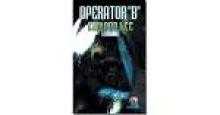 Operator B
Operator B Bullet Through Your Face (improved format)
Bullet Through Your Face (improved format) Grimoire Diabolique
Grimoire Diabolique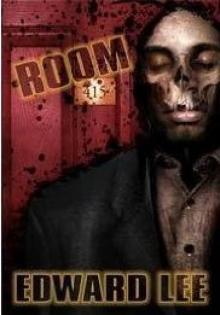 Room 415
Room 415 The Messenger (2011 reformat)
The Messenger (2011 reformat) Incubi
Incubi The Black Train
The Black Train House Infernal by Edward Lee
House Infernal by Edward Lee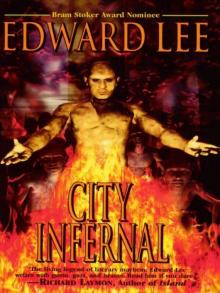 City Infernal
City Infernal Creekers
Creekers The Haunter Of The Threshold
The Haunter Of The Threshold Mangled Meat
Mangled Meat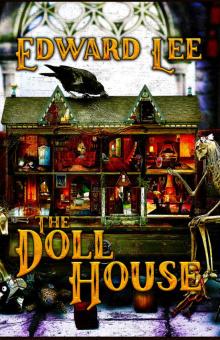 The Doll House
The Doll House Header 2
Header 2 Bullet Through Your Face (reformatted)
Bullet Through Your Face (reformatted)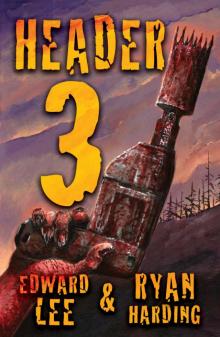 Header 3
Header 3 Infernal Angel
Infernal Angel Pages Torn From a Travel Journal
Pages Torn From a Travel Journal Edward Lee: Selected Stories
Edward Lee: Selected Stories The Bighead
The Bighead The Chosen
The Chosen